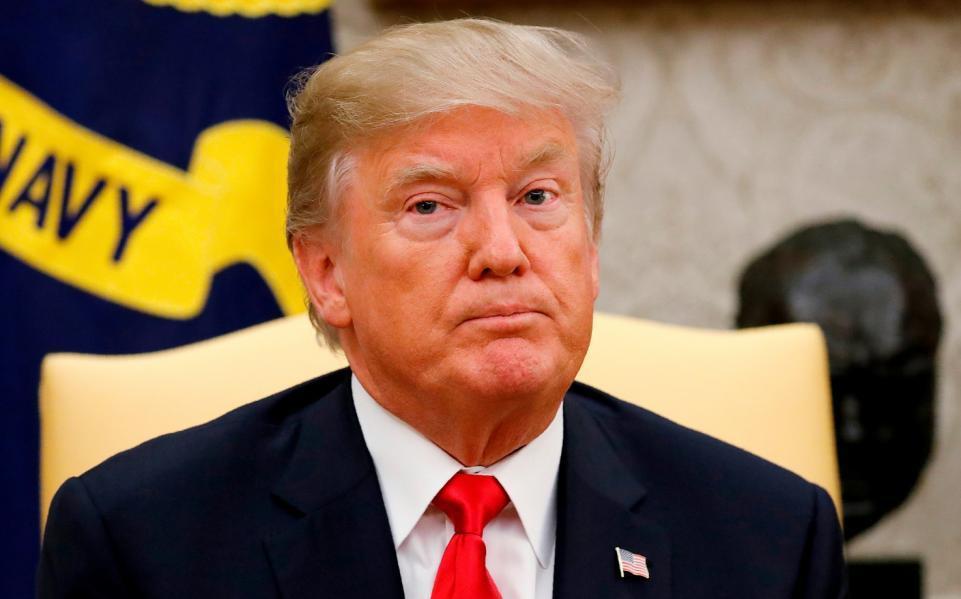
U.S. President Donald Trump was evasive on April 12 over when the United States might fire missiles at Syria in retaliation for an alleged chemical weapons attack, saying they could come at any time.
One day after warning regime-backer Russia that “missiles will be coming” to Syria, Trump in another early morning tweet storm wrote: “Never said when an attack on Syria would take place. Could be very soon or not so soon at all!”
French President Emmanuel Macron said on April 12 that he had “proof” that the regime of Syrian President Bashar al-Assad had used chemical weapons, and would respond to it “at a time of our choosing.”
Macron has insisted he does “not want an escalation” and that any response would focus on Syria’s chemical capabilities, not on allies of the regime.
British Prime Minister Theresa May was set to to hold an emergency cabinet meeting amid speculation she will support U.S. action against the Syrian regime.
Germany’s Angela Merkel said it was “obvious” that Syria hadn’t eradicated its chemical arsenal as it had earlier claimed.
She said a “full spectrum of measures” will be considered in response to the gas attack, but ruled out any military deployment.
“Germany will not participate militarily, but we will provide our support if the representatives in the UN Security Council ... were to take steps beyond diplomatic measures,” she said.
Germany has deployed reconnaissance and refuelling flights as part of the international operation against Islamic State of Iraq and the Levant (ISIL) in Syria.
But any further military role would require parliamentary approval.
Opponents of unilateral U.S. action called an emergency closed-door meeting of the U.N. Security Council.
The White House has said that Trump holds Assad’s regime and its military backers Russia responsible for an alleged attack on Douma on April 7, which rescue workers said killed more than 40 people.
Trump slammed Russia on April 11 for its military alliance with Assad, saying it should not “be partners with a Gas Killing Animal who kills his people and enjoys it.”
U.S. officials have refused to rule out direct military engagement with Russia, with the White House saying that “all options are on the table.”
Defense Secretary Jim Mattis said on April 11 that the Pentagon was ready to provide options for a Syria strike but that the U.S. and its allies were still “assessing the intelligence” on the suspected chemical attack.
A special hotline for the U.S. and Russian militaries to communicate about operations in Syria is active and being used by both sides, Moscow said on April 12.
Kremlin spokesman Dmitry Peskov warned that it was “crucial to avoid any steps that could lead to heightened tensions” in Syria, saying this would have an “extremely destructive influence” on attempts to resolve the conflict.
Assad warned on April 12 that threats of Western military action “will only contribute to further destabilization in the region.”
Russia has warned the United States against carrying out a “military intervention on fabricated pretexts,” and has accused the White Helmets civil defense organization in Syria of staging a fake chemical weapons attack in Douma.
The Russian army declared early on April12 that the Syrian state flag was flying in Douma, where the alleged chemical attack took place.
Moscow said this a “significant event in the history of Syria,” meaning that the whole of Eastern Ghouta had come under government forces’ control.
Rebels in Syria’s Eastern Ghouta surrendered their heavy weapons and their leader left the enclave, while the Syrian flag was raised over the central mosque, the Syrian Observatory for Human Rights monitoring group said.
However Douma residents told AFP that a dispute subsequently erupted with shots fired and the flag was taken down from the mosque.
United Nations Secretary General Antonio Guterres on April 11 said he had met with ambassadors from the five permanent members including Russia and the United States, and “stressed the need to avoid the situation spiraling out of control.”
At the U.N. Security Council, Moscow and Washington have so far vetoed each other’s motions to set up an international investigation into chemical weapons use.
Syria said it had invited the Organization for the Prohibition of Chemical Weapons, which has blamed the regime for previous attacks, to visit Douma.